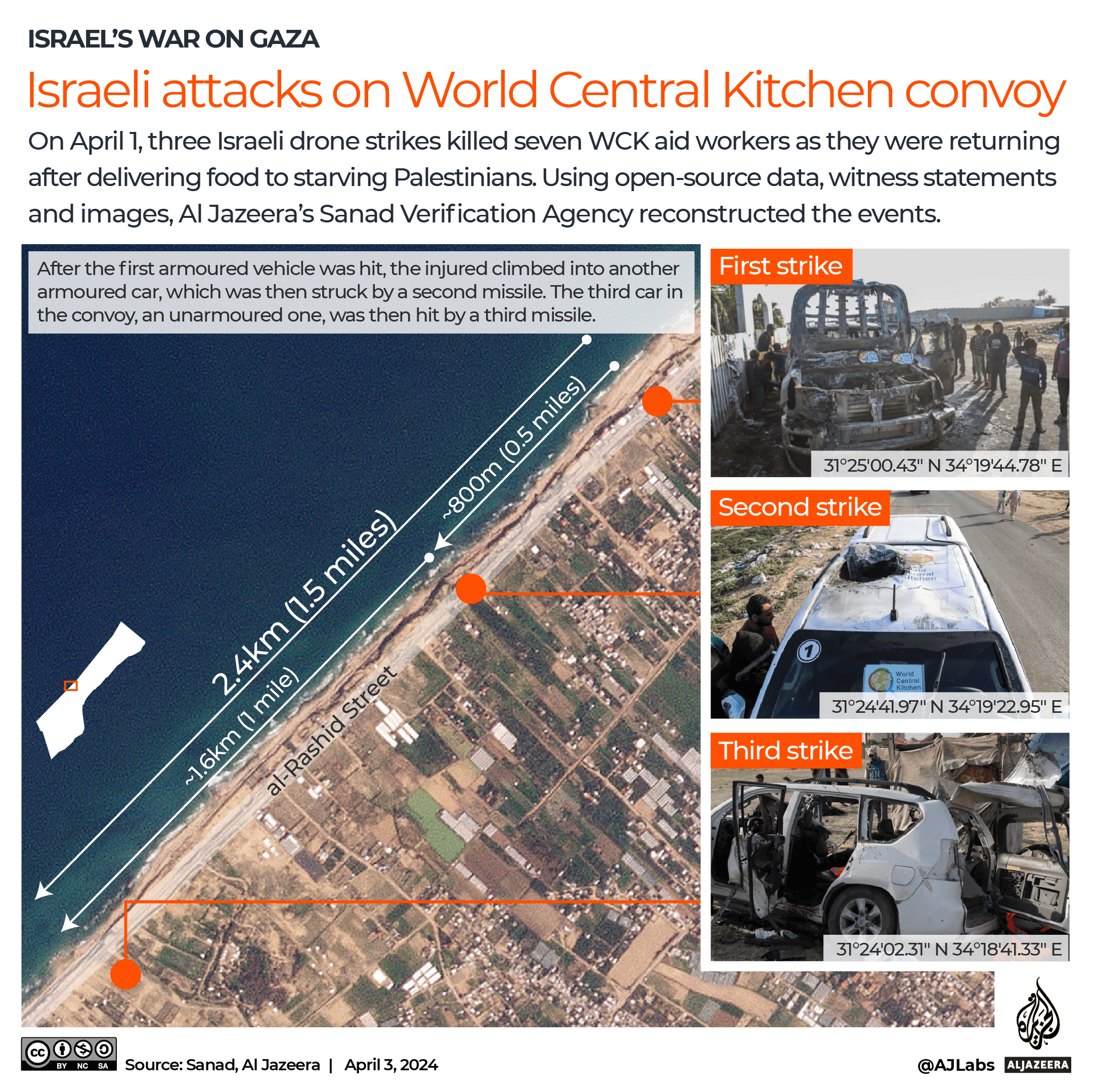Poland’s PM blasts Israeli leaders over aid attack
Israel’s air raids on the World Central Kitchen convoy that killed seven aid workers, including a Polish national, is undermining ties between Israel and Poland, says the country’s prime minister.
In a post on X, Donald Tusk said while the “vast majority of Poles showed full solidarity with Israel after the Hamas attack” on October 7, this solidarity is now being put “to a really hard test”.
“The tragic attack on volunteers and your reaction arouse understandable anger,” he said.
Polish prosecutors launch investigation into aid worker killing
Prosecutors in Przemysl, where Polish aid worker Damian Sobol is from, are independently investigating the circumstances of his killing in Gaza, Deputy District Prosecutor Beata Starzecka has told Poland’s PAP press agency.
Sobol, 35, was among seven aid workers killed by a succession of Israeli air strikes on their convoy in an attack that Poland’s prime minister said is putting Israel and Poland’s relations “to a hard test”.
The Israeli military has called the attack a “mistake” and promised to investigate how it happened. An investigation by Al Jazeera’s Sanad verification agency has found the attack was intentional.
Poland summons Israeli envoy over aid worker’s death: Report
Poland’s deputy foreign minister says he summoned Israel’s ambassador to discuss the death of a Polish aid worker killed in an Israeli strike in Gaza.
“I want to talk to the ambassador about the new situation in Polish-Israeli relations and about the moral, political and financial responsibility for the event that recently took place in the Gaza Strip”, Andrzej Szejna told the Polish state news agency PAP.
Questions in Israel over who ordered aid convoy strikes
In Israel, there’s been very little reaction to allegations that the attack on the World Central Kitchen convoy was deliberate.
However, there is a brewing controversy about how this actually happened. Whenever there is an Israeli military strike, there is a clear command-and-control structure. Someone in the command centre, a senior military person, needs to sign off on any strike that happens on vehicles. This is just standard practice.
So there was either a clear failure of that command-and-control structure or the attack was deliberate, which is what people are discussing right now.
If you speak to the Americans, the British, the Canadians, the Poles, and the Australians – whose citizens were killed in the attack – they are really pushing for a clear investigation. They want to know how this actually happened.
However, will the public see the results of the investigation, or will the Israelis say to the countries involved: “We’re going to give you the results, but we can’t make them public.”
Who authorised the Israeli air strikes on the aid convoy in Gaza?
Al Jazeera’s investigation into the deadly Israeli air strikes on the aid workers’ convoy shows three separate attacks on vehicles.
Omar Ashour, a professor of military and security studies at the Doha Institute of Graduate Studies, says after the first two vehicles were hit, there had to be communication among the Israeli military before the third was targeted, indicating “an intentional issue there”.
He said the great expense of the missiles used in the strikes “would need some command level” authorisation. However, he noted, the way the military operates, it may have been a less senior officer who ordered the strikes.
“The Israeli army has been fighting since 1948 onwards in a relatively decentralised way. The ‘tactical aggression’ is very high. They devolve junior officers to take quick decisions on the battlefield without going back to the senior ones. Interestingly, they took this from the Wehrmacht, the German army, in World War II,” Ashour told Al Jazeera.





















